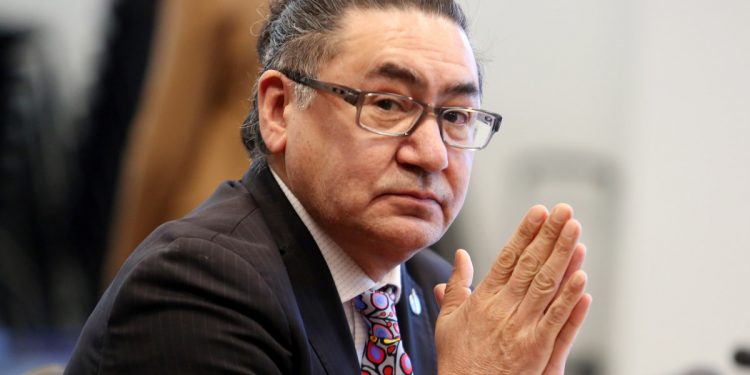By Alex Neve May. 22, 2019
With only five sitting weeks to go, Parliamentarians face high expectations on bills on Indigenous languages and rights, environmental protection, and more.
NDP MP Romeo Saganash introduced Bill C-262 in 2016 and is still waiting for it to pass. It would set a framework for implementing the United Nations Declaration on the Rights of Indigenous Peoples. The Hill Times photograph by Andrew Meade
There is an enormous amount of consequential human rights legislation approaching the parliamentary finish line. The time to get it across shrinks daily.
Only four sitting weeks remain in this session of Parliament for MPs, five for Senators. Rather than return to Parliament in the fall, MPs will be out hustling for votes. That means parliamentary business not concluded by the House of Commons and Senate’s last sitting days, currently June 21 and 28 respectively, will, as is said, “die on the order paper.” Bills not adopted, orders-in-council not approved, and ministerial decisions not authorized will await whatever the next Parliament holds.
Here are 12 bills and decisions being watched closely by Indigenous peoples, human rights groups, and communities across the country.
Bill C-262 would set a framework for implementing the United Nations Declaration on the Rights of Indigenous Peoples, which the Truth and Reconciliation Commission stated provides “the necessary principles, norms, and standards for reconciliation to flourish in 21st-century Canada.” It was introduced in April 2016 by NDP MP Romeo Saganash and embraced by the government in November 2017. It has been in the Senate for the past year and faced delays from several Conservative Senators. There is enough time for Senators to pass C-262, but it is tight.
Also facing a rough ride in the Senate is Bill C-69, which includes important provisions to assess the positive and negative human rights impacts of resource development projects on Indigenous peoples and people of different genders. It has become a flashpoint in the politicized debate about pipelines and climate change. After extensive cross-country Senate hearings and hundreds of amendments proposed by Senators, it is unclear if enough time remains for the bill to be reviewed and become law.
The Senate is seized with C-59 and C-83, reforms to national security and solitary confinement. Each one fixes long-standing human rights concerns to a degree, but leaves major shortcomings unaddressed and introduces new human rights problems. Human rights groups have proposed amendments, but with pressure on Senators to get bills done, worries mount that any improvements will be limited.
That was the fate of Bill C-85, updating the Canada-Israel Free Trade Agreement, quickly passed by the Senate May 9 and awaiting the Governor General’s signature. It remains without crucial amendments to exempt goods and services originating in illegal Israeli settlements in occupied Palestinian territory.

From left, UN Permanent Forum on Indigenous Issues chair Mariam Wallet Med Aboubakrine, Inuk human rights advocate Rosemarie Kuptana, Amnesty International Canada secretary-general Alex Neve, and Assembly of First Nations national chief Perry Bellegarde speak to reporters in Ottawa on April 1 to urge the Senate to pass Bill C-262, the UN Declaration implementation bill. The Hill Times photograph by Andrew Meade
Bills C-91 and C-92, while neither perfect, would institute sorely needed human rights protections with respect to Indigenous languages and Indigenous children. They were introduced in the House in February and will require exemplary co-operation from MPs and Senators to be adopted.
Bill C-97, omnibus budget implementation legislation, is a mixed human rights story. It includes a proposal to curtail access to independent hearings for refugee claimants who have made previous claims in a number of countries, including the United States, which is hardly a safe country for refugees under Donald Trump’s administration. The government has rebuffed calls to withdraw that provision.
Bill C-97 also promises a long-awaited human rights-based national housing strategy. Advocates have proposed amendments to strengthen that strategy. If adopted, this would be groundbreaking recognition of homelessness and housing as the human rights issue it is.
On May 7, the government introduced Bill C-98, to establish independent review and oversight of the Canada Border Services Agency’s considerable arrest and detention powers. Without unanimous agreement, it is unlikely C-98 can be adopted before Parliament concludes.
Then there is cabinet business. In January 2018, the government announced the establishment of a new ombudsperson to investigate alleged human rights abuses associated with Canadian companies operating abroad. The first ombudsperson, Sheri Meyerhoffer, was appointed last month. Whether she will be granted powers needed to investigate awaits a cabinet decision.
The National Inquiry into Missing and Murdered Indigenous Women’s final report will be released on June 3. As a next step, Crown-Indigenous Relations Minister Carolyn Bennett should implement the national inquiry’s call to bring the outstanding provisions of Bill S-3 into force before the federal election, to end sex discrimination in the Indian Act. There must also be comprehensive action underway before Parliament winds down. Indigenous women, girls, and two-spirit people cannot endure further uncertain waiting for the government to uphold their rights.
It is crucial that ministers, MPs, and Senators use each hour of every day of these remaining weeks to the maximum advantage and advance these crucial human rights reforms.
Alex Neve is secretary-general of Amnesty International Canada.
The Hill Times






















